From the journal of Steven H. Cullinane...
2008 Septembert 01-30
Tuesday, September 30, 2008 1:14 AM
In memory of Paul Newman:
Hole in the Wall
Loren Eiseley,
Notes of an Alchemist:
I never found
the hole in the wall;
I never found
Pancho Villa country
where you see the enemy first.
-- "The Invisible Horseman"
This quotation is the result of
the following meditation:
Part I:
The Feast of St. Michael
and All Angels
On Michaelmas 2008 (yesterday):
The mailman brought next Sunday's New York Times Book Review.
On the last page was an essay by Steven Millhauser, "The Ambition of
the Short Story." It said that...
"The short story concentrates on its grain of sand, in the fierce
belief that there-- right there, in the palm of its hand-- lies the
universe. It seeks to know that grain of sand the way a lover seeks to
know the face of the beloved."
Part II:
An Actor's Lesson
A search for the "grain of sand" phrase in
this journal yielded a quotation from actor Will Smith:
"Smith has just finished reading The Alchemist, by the Brazilian writer Paulo
Coelho: 'It says the entire world is contained in one grain of sand,
and you can learn everything you need to learn about the entire
universe from that one grain of sand. That is the kind of concept I'm
teaching my kids.'"
The quotation's source is The
Independent of July 9, 2004.
Part III:
A date with Reba
The date of The Independent's story
turns out to contain, in
this journal, a meditation on white-trash food and Reba McEntire.
(Recall her classic lyric
"I might have been born
just plain white trash,
but Fancy was my name.")
It also contains the Notes of an Alchemist quotation above.
"Let, then, winged Fancy find
Thee a mistress to thy mind"
-- John Keats, "Fancy"
A passage closely related to Keats's poem:
"Fullness... Multitude."
These are the missing last words of Inman in Cold Mountain,
added here on the Feast of St. Luke, 2004. For the meaning of
these words, click on Luke. |
Sunday, September 28, 2008 2:02 AM
Today's Sermon:
Buffalo Soldier
Part I:
Retired pastor William W. McDermet III on the editorial page of
Saturday's Buffalo News (Warren E. Buffett, chairman):
"In the 1940s, there was no Internet or television, so after school I
amused myself with a snack of graham crackers and milk, maybe a comic
book or a Tinkertoy project. Yet what was really exciting was a
frequent ring of the doorbell, which mother answered, followed by the
request: 'Can Billy come out and play?'"
Part II:
Excerpt
from Fritz Leiber's
"Damnation Morning," 1959:
"Time traveling, which is not quite the good clean boyish fun it's
cracked up to be, started for me when this woman with the sigil on her
forehead looked in on me from the open doorway of the hotel bedroom
where I'd hidden myself and the bottles and asked me,
Saturday, September 27, 2008 6:00 PM
For Paul Newman:
Lotteries
Sept.
26,
2008 |
Pennsylvania
(No revelation)
|
New York
(Revelation)
|
Mid-day
(No belief)
|
No belief,
no revelation
084
|
Revelation
without belief
006
|
Evening
(Belief)
|
Belief without
revelation
340
|
Belief and
revelation
006
|
Friday, September 26, 2008 3:17 PM
Mathematics and Beauty:
Christmas Knot
for T.S. Eliot's birthday
(Continued from Sept. 22--
"
A Rose
for Ecclesiastes.")
From Kibler's
"
Variations
on a Theme of
Heisenberg, Pauli, and Weyl,"
July 17, 2008:
"It is to be emphasized
that the 15 operators...
are underlaid by the geometry
of the generalized quadrangle
of order 2.... In this geometry,
the five sets... correspond to
a spread of this quadrangle,
i.e., to a set of 5 pairwise
skew lines...."
--
Maurice
R. Kibler,
July 17, 2008
For ways to visualize
this quadrangle,

see
Inscapes.
|
Related material
A remark of Heisenberg
quoted
here on Christmas 2005:

"... die Schönheit... [ist] die
richtige Übereinstimmung
der Teile miteinander
und mit dem Ganzen."
"Beauty is the proper conformity
of the parts to one another
and to the whole."
|
Monday, September 22, 2008 7:20 PM
Annals of Poetry:
Gates of Hell
(continued from
the
birthday
this year of Pope Benedict XVI)
"'I took a course in modern poetry when I was back
at the university,' he began. 'We read six authors-- Yeats, Pound,
Eliot, Crane, Stevens, and Gallinger-- and on the last day of the
semester, when the prof was feeling a little rhetorical, he said,
"These six names are written on the century, and all the gates of
criticism and Hell shall not prevail against them.''"
The last poet of the six is fictional.
The name "Zelazny" might be
subsituted for "Gallinger."
It won't happen, but
I wouldn't
mind if it did.
Sunday, September 21, 2008 2:56 PM
Happy Birthday, Stephen King:
A Tale
"... told by an idiot,
full of sound and fury,
signifying
nothing"
-- Quoted here
Sept.
14
"
We've got to get ourselves
back to the
garden."
-- Quoted here Sept.
10

"The woman introduced herself. 'I am Mrs. Benjamin Rand. I am
called EE by my friends, from my Christian names, Elizabeth Eve.'
'EE,' Chance repeated gravely.
'EE,' said the lady, amused.
Chance recalled that in similar situations men on TV introduced
themselves. 'I am Chance,' he stuttered and, when this didn't seem to
be enough, added, 'the gardener.'"
-- Jerzy Kosinski, Being
There
|
Related material:
"Heidegger's philosophy of Dasein, his model
of the ego, reminds me of... the ancient temple of Jerusalem.... in the
innermost chamber, the holy of holies, the room was completely empty.
The essence of Dasein, similarly, is nothingness, a fact that
it tries to hide by assuming the trappings of existence."
-- Heinz Pagels,
The
Dreams of Reason
"Nothing is the great mystery. It cannot be
described. Words can try to touch it. Zen may be such a word and Tao,
Christ, Allah, Buddha, and others. There is a word called 'God.'"
-- Janwillem van de Wetering,
A
Glimpse of Nothingness
Sunday, September 21, 2008 7:11 AM
For John von Neumann:
The Revelation Game
(continued
from Sept. 8)
Lotteries
Sept.
20,
2008 |
Pennsylvania
(No revelation)
|
New York
(Revelation)
|
Mid-day
(No belief)
|
No belief,
no revelation
531
|
Revelation
without belief
116
|
Evening
(Belief)
|
Belief without
revelation
228
|
Belief and
revelation
000
|
Related material:
Deep
Beauty
Saturday, September 20, 2008 11:27 AM
At Times:
Saturday, September 20, 2008 1:09 AM
The Religion of Journalism, continued:
In memory of
Walked to the store the other day
(Your left, your left, your left right left)
Dead men beside me all the way
(Your left, your left, your left right left)
Didn't know it then but I know it now
(Your left, your left, your left right left)
Heard it through the grapevine,
don't know how
(Your left, your left, your left right left)
Dead men beside me all the way
(Your left, your left, your left right left)
One to count cadence and one to pray
(Your left, your left, your left right left)
|
Friday, September 19, 2008 2:02 AM
Extra Ecclesiam:
Thursday, September 18, 2008 7:25 AM
The Religion of...
Journalism
jour·nal·ist
- One whose occupation is journalism.
- One who keeps a journal.
--
The American Heritage Dictionary
of the English Language,
Fourth Edition, according to
Dictionary.com
|
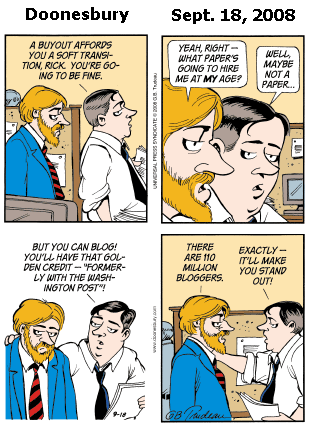 Related material:
Related material:
"We seem to be caught in a squirrel cage, running as
hard as possible and getting nowhere. At times like this, almost anyone
will find real help in writing the feelings and thoughts down in a
journal or notebook.... Later on we shall look at other ways in which a
journal record is important."
-- Fr. Morton Kelsey,
The
Other Side of Silence
See also Tuesday's
Church
of the Forbidden Planet and the journal
entry
of October 9, 2005, which contains both the thoughts of Joan Didion
on Hoover Dam and the following meditation:
|

A quotation that somehow
seems relevant:
O the mind, mind has mountains,
cliffs of fall
Frightful, sheer, no-man fathomed.
Hold them cheap
May who ne'er hung there.
-- Gerard
Manley Hopkins
|
Thursday, September 18, 2008 12:00 AM
Religion, Politics, Economics:
"Surely some
revelation
is at hand"
-- W. B. Yeats
"Obama stands revealed
as a typical Democratic politician with the same laundry list of
suppositions and policy stances that all his predecessors have shared:
there's an unbroken line from Obama's speech all the way back to FDR."
-- Mark
Heuring, conservative Catholic writer, on August
28, 2008 (St.
Augustine's Day)
"The United States presidential election of 1932 took place as the
effects of the 1929 Stock Market Crash and the Great Depression were
being felt intensely across the country. President Hoover's popularity
was falling as voters felt he was unable to reverse the economic
collapse.... Franklin D. Roosevelt saw that Hoover's failure to deal
with these problems could be used as a platform for his own
election...."
-- Wikipedia
today
Tuesday, September 16, 2008 9:00 AM
Church of the Forbidden Planet:
Sunday, September 14, 2008 3:09 PM
Two-Part Invention:
On John McCain's presidential campaign eight years ago:
"He always pauses a second for effect and then says: 'I'm going to tell
you something. I may have said some things here today that maybe you
don't agree with, and I might have said some things you hopefully do
agree with. But I will always. Tell you. The truth.' This is McCain's
closer, his last big reverb on the six-string as it were. And the
frenzied standing-O it always gets from his audience is something to
see. But you have to wonder. Why do these crowds from Detroit to
Charleston cheer so wildly at a simple promise not to lie?
Well, it's obvious why. When McCain says it, the people are cheering
not for him so much as for how good it feels to believe him. They're
cheering the loosening of a weird sort of knot in the electoral tummy.
McCain's resume and candor, in other words, promise not empathy with
voters' pain but relief from it. Because we've been lied to and lied
to, and it hurts to be lied to. It's ultimately just about that
complicated. It hurts.
We learn this at like age four-- it's grownups' first explanation to us
of why it's bad to lie ('How would you like it if...?'). And we
keep learning for years, from hard experience, that getting lied to
sucks-- that it diminishes you, denies you respect for yourself, for
the liar, for the world. Especially if the lies are chronic, systemic,
if experience seems to teach that everything you're supposed to believe
in's really just a game based on lies....
... It's painful to believe that the would-be 'public servants' you're
forced to choose between are all phonies... who will lie so
outrageously and with such a straight face that you know they've just
got to believe you're an idiot."
Wednesday, September 10, 2008 1:06 PM
Sex, Lies, and YouTube:
Hitler on
Democracy
The Fuehrer's wisdom seems especially appropriate today, in light of
John McCain's recent "sex education for
kindergarteners" and "lipstick" ads:
"... thus in the primitive simplicity of their minds they more readily
fall victims to the big lie than the small lie, since they themselves
often tell small lies in little matters but would be ashamed to resort
to large-scale falsehoods. It would never come into their heads to
fabricate colossal untruths, and they would not believe that others
could have the impudence to distort the truth so infamously.... The
grossly impudent lie always leaves traces behind it, even after it has
been nailed down."
 "I'm Joseph Goebbels, and
"I'm Joseph Goebbels, and
I approve this message."
Wednesday, September 10, 2008 4:40 AM
Garden Party
Yesterday
this journal had
an entry, titled
"Back to the Garden,"
quoting Don Henley's
song "Garden of Allah."
Henley's Garden is,
of course, not a
religious
concept,
but rather a
Hollywood hotel.
(Think " Barton Fink.")

An echo:
"We are stardust,
billion year old carbon.
We are golden,
caught in
the devil's bargain,
and we've got to
get ourselves
back to the garden."
-- Joni
Mitchell
In memory of
one not caught in
the devil's bargain --
W.
Deen Mohammed,
who died yesterday --
a link:
Ramadan,
Counterculture,
and Soul.
|
Tuesday, September 9, 2008 1:00 PM
Back to the Garden...
And the fruit is rotten.
The serpent's eyes shine
As he wraps around the vine
In the Garden of Allah.
|
Monday, September 8, 2008 2:25 PM
But seriously...
 Related material:
Related material:
Aesthetics for Jesuits
Joke
The Guardian, July 26,
on a work by the
late playwright
George Tabori:
"... inspired satire, laced with Jewish and
Christian polemics, sparkling wit and dazzlingly simple effects. For
Golgotha a stagehand brings on three crosses. 'Just two,' says Jay.
'The boy is bringing his own.' Tabori often claimed that the joke was
the most perfect literary form."
|
Update at noon,
Sept. 9, 2008:
Tabori, a
Jew
from
Hungary
and former
screenwriter
("
No
Exit"), died at 93
on
July 23, 2007.

For related material on
another Jew from
Hungary
click on the black monolith
(also known as
the
Halmos tombstone).
Monday, September 8, 2008 5:01 AM
ART WARS continued:
Sunday, September 7, 2008 6:23 PM
Century's Best:
From the
Finland Station
For
C.
Sheridan Murphy,
Radcliffe '65...
A footprint from Finland:
The entry it leads to:
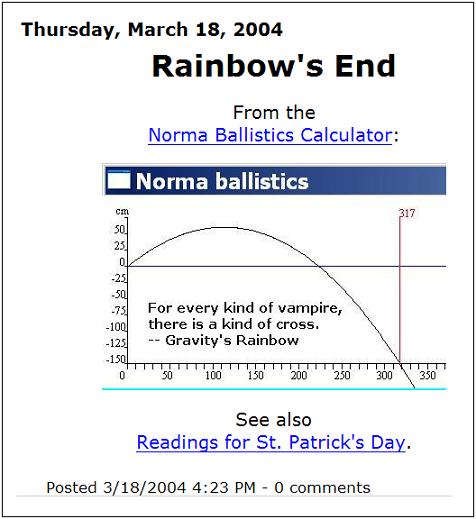
Related material:
A eulogy
for the late
editor Robert Giroux:
"How many masterpieces Mr. Giroux discovered will be
for the future to decide. As he himself insisted, it can take decades
for a book to become a classic. Still, one of the first books he edited
is now on any list of the
century’s best:
To
the Finland Station,
Edmund Wilson’s 1940
masterwork on the rise of socialist thinking. Mr. Giroux judged the
manuscript to be nearly flawless."
Sunday, September 7, 2008 3:16 PM
On Constitutional Law:
Pro Bono
Sunday, September 7, 2008 7:09 AM
Today's Sermon:
Bringing Change
to Washington
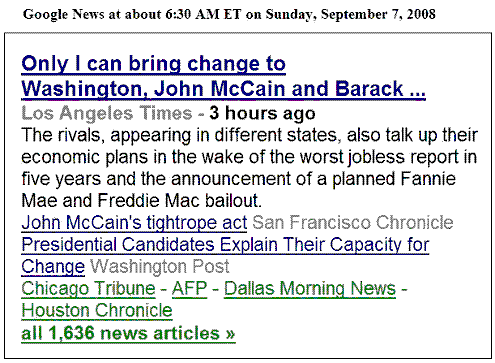 First in War,
First in War,
First in Peace...
Quotations for
Chairman George
|
Change for Washington:

For the details, see
yale.edu/lawweb:
"As important to Chinese civilization as the Bible is
to Western culture, the
I Ching or
Book of Changes is
one of the oldest treasures of world literature. Yet despite many
commentaries written over the years, it is still not well understood in
the English-speaking world. In this masterful [
sic]
new interpretation, Jack Balkin returns the
I Ching to its
rightful place....

\
Jack M. Balkin
is
Knight Professor of Constitutional Law and the First Amendment at Yale
Law School, and the founder and director of Yale's Information Society
Project. His books and articles range over many different fields...."
Sunday, September 7, 2008 5:01 AM
On Style, continued:
Friday, September 5, 2008 2:45 AM
Whistling Past the Graveyard:
For
Mike Hammer
Block That Metaphor
"Michael Hammer, an engineer and author on management
who helped popularize the 're-engineering' movement in the 1990s, died
Thursday [Sept. 4, 2008].
A spokesman for Mr. Hammer's consulting firm, Hammer
and Co., said Mr. Hammer died from cranial bleeding that began Aug. 22
while he was vacationing in Massachusetts. He was 60 years old.
Mr. Hammer was the co-author of the bestselling
management book Reengineering the Corporation and founder and
president of Hammer and Co., Cambridge, Mass."
-- The
Wall Street Journal
"An engineer by training, Hammer focused on the operational nuts and
bolts of business.
Hammer's relentless pursuit of 'why?' drove his entire career. 'My
modus operandi is simple,' he once wrote, 'though not always easy to
carry out. I take nothing at face value. I approach all business issues
and practices with the same skepticism: Why?'
A funeral will be held at 9:30 a.m. Friday, Sept. 5 in
Stanetsky Memorial Chapel, 1668 Beacon St., Brookline. Interment
will follow at the Shaarei Tefillah Section of the Chevra
Shaas Cemetery at Baker Street Jewish Cemeteries in West Roxbury."
-- web.mit.edu
Related material:
From
Feb. 12:

From today:
Outside the Box

"I need a photo opportunity,
I want a shot at redemption.
Don’t want to end up a cartoon
In a cartoon graveyard..."
--
Paul Simon






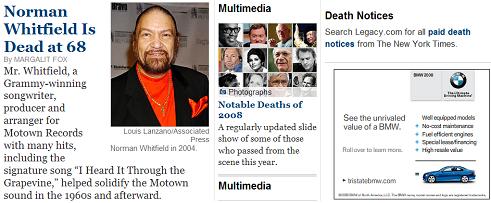
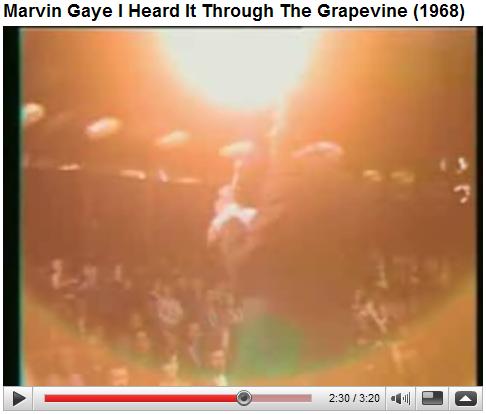


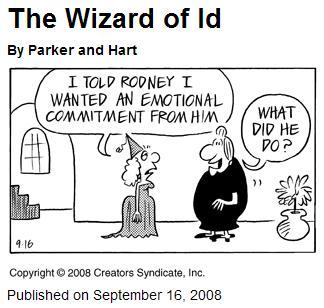
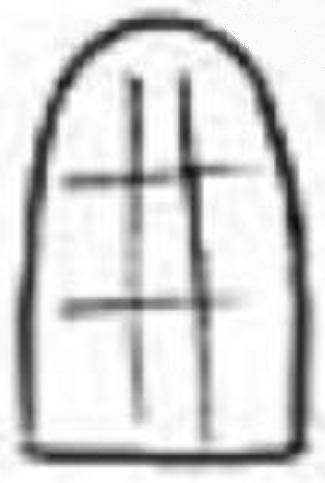









 \
\
